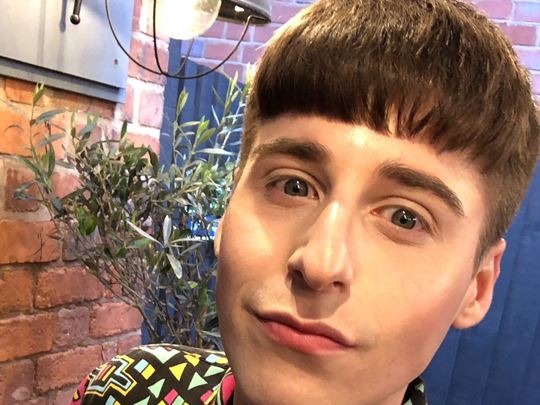My name is Leon and I am a foster carer for FCA Midlands South and I am a “Gay man.”
Now many of you may be wondering why I’m introducing myself in such a term? Simply I’ve done this as I feel confident and proud of who I am as a human being. Whilst completing my journey being supported along the way I am able to make this statement now. But as I write this it also highlights to me that not all people do feel this way and face real struggles with this. “That feeling when coming out” What if they don’t accept me?
Recently in the social media world there has been a huge amount of talk on a Netflix series called ‘Heartstopper’ this programme is about teens Charlie and Nick who discover their unlikely friendship might be something more as they navigate school and young love. After watching this myself and partner James was really taken back by the programme and it brought back a lot of discrimination that we faced ourselves when discovering our identity. We felt that this programme portrayed many topics within the series in a positive and supportive way towards the LGBT+ community. I’m sure many of us feel as though times have changed and moved forward and that some of these challenges do not exist. But the harsh reality is that a vast amount of the topics that are shown are still around to this day. For anybody that has not seen this programme it’s such an uplifting and educational series and is a must to watch. Also recommend showing to your young people and if TV is not for them, there are books!

PRIDE month (June) is about breaking the silence and having open and honest conversations around this topic has never been more of an ideal time. The importance of this recognised month within the LGBT+ community is massive. For many it is a support network to where people who are part of this community can feel safe and happy, feeling they belong without any judgement. As I was writing this, I was using the term LGBTQ+ and have always used this acronym but after doing some research it came to my attention that as the Q letter represents the term Queer/Questioning some people may find this offensive, so I removed the Q and improved my knowledge. But then on the other hand, LGBTQ+ is used as an umbrella acronym for people who identify as Queer/Questioning and is used to show as a sign of inclusion. This seems very confusing, I agree. The only advise I would give is use what you feel is appropriate, we can never please the whole of society but can be educated. Why is Pride month in June you may ask? – to commemorate the Stonewall riots, which occurred at the end of June 1969 in the United States. Do we know there is a difference between Pride month and Gay History month?
People often make comments/assumptions without thinking about how this impacts the person and I thought I would share some of the comments I’ve had to face in 2022 (UNP: Un-named Person)
- UNP: Why do you foster and not have your own children?Me: Because I’m in a same sex relationship and it isn’t as straight forward to conceive naturally. With fostering we can make a difference to many children’s life.
- UNP: Have you got a pride flag we can use?Me: No, I haven’t (thinking am I supposed to have a draw full of flags? UNP: I thought you would have one!
- UNP: The new store manager is gay I will have a new gay best friend now.Me: Please do not say that to him because it makes it sound as though his friendship is only worthy because of his sexuality.
- UNP: I didn’t realise you was gay I always thought you was straight.Me: You shouldn’t really assume somebody’s sexuality (Thinking am I supposed to wear a badge saying I am gay)
From our own journey through fostering, we all engage in training and are offered support through different networks. This we have found to be very useful and think that it’s something that makes FCA stand out from other providers. We are part of the Polaris Community who already cover an extensive range of training and support. You all have an abundance of skills and knowledge which would be transferable towards the subject but what is the harm in exploring this subject even further? This topic is most probably something that hasn’t been on your agenda for many reasons, so I feel that by me writing this blog it may question us are we ready to face this massive subject with our young people? Whether this is in a current placement or a future placement we may have. Do we have the right knowledge and understanding? My overall aim for sharing this is to share real life experience in hope our agency can potentially provide a training course/support network readily available for all of our foster carers who feel it would benefit them, meaning this would enable us to broaden our knowledge and give support around the topic. In turn I believe this will enable us to provide better outcomes for our young people in our care and provide a safe inclusive culture in line with our current ethos. Making FCA a more equality, diverse and inclusive provider.
What do I believe we could achieve and learn from talking about this subject?
- What support is already available for young people dealing with sexuality?
- So many labels, do we understand them? What does LGBT+ represent?
- Do we understand what terminology is used to represent an individual’s identity?
- Affects that social media have on identity – Bullying/Cyber Bullying
- How to promote safer sex & sexual health advice (Age appropriate)
- Safeguarding through the world of online dating apps, grooming, drugs, catfishing
- Supporting mental health, signpost to relevant professionals
- How to deal with the “coming out” stage sensitively
- Signpost young people to groups that can help them network and create a sense of belonging
- Stigma around unhealthy relationships in LGBT+ community
- Do we know how to use gender pronouns correctly – He/Him/His (For someone who might identify as male), She/Her/Hers (For someone who might identify as female), They/Them/Their (For someone who might not identify as male or female, these pronouns are ‘gender neutral’ they are also used when referring to multiple people)
- Create events and support options through our participation teams – helping to shape a better future for our generation.
- Transition guidance, referrals/appointments, medication and policy (Course available on Learnative 1HR) – 84% have thought about ending their life at some point (Trans Mental Health Review, 2009 (Statistic from course, is this a true figure today?)
I leave this blog with a simple review from Heartstopper. Heartstopper is the beautiful, warm, uplifting love story LGBTQ kids deserve and LGBTQ adults needed when we were kids. There’s something to relate to in all the characters, from simple silly things like Charlie saying things like ‘I don’t just fall for any boy that’s nice to me’, to much deeper inner conflicts like when another character who is struggling to figure out and understand their sexuality by googling for answers.
Hope you have enjoyed reading this blog and have been able to take away some of the points discussed.
Useful Links
More blogs…
Can’t find what you’re looking for?
By Phone
Call a member of our friendly fostering team and they’ll be able to answer all your questions
By Email
Email our team by completing our online enquiry form
Visit an office
We are always happy for you to pop in for a chat




